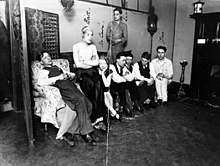Disorderly house

In English criminal law a disorderly house is a house in which the conduct of its inhabitants is such as to become a public nuisance, or outrages public decency, or tends to corrupt or deprave, or injures the public interest; or a house where persons congregate to the probable disturbance of the public peace or other commission of crime. To persistently or habitually keep a disorderly house is an offence against the common law, punishable by fine or imprisonment.[1]
A charge of keeping a disorderly house is the typical charge against one accused of maintaining a brothel, and as brothel-keeping is one of the most common causes for the charge of keeping a disorderly house, "disorderly house" is something of a euphemism for brothel in the English legal community. The laws on the subject of brothels as disorderly houses are found under statutory offences under sections 33 to 36 of the Sexual Offences Act 1956.[2]
History
There were formerly statutory provisions relating to disorderly houses under:
- the Disorderly Houses Act 1751.[3]
- sections 1 and 2 of the Sunday Observance Act 1780.[4]
Both acts have been repealed.
See also
References
- ↑

- ↑ "Sexual Offences Act 1956". www.legislation.gov.uk. Retrieved 2016-11-30.
- ↑ Disorderly Houses Act 1751
- ↑ Sunday Observance Act 1780
Further reading
- Archbold Criminal Pleading, Evidence and Practice (2008) 20-246 to 20-251